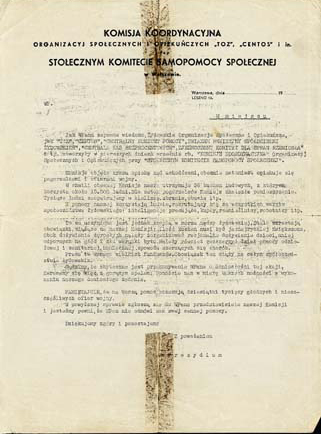On September 1, 1939, German troops invaded Poland and subsequently triggered the start of World War II. In response to this aggression, Britain and France declared war on Germany on September 3. After signing the German-Soviet Pact in August, 1939, Germany could ensure that they would not encounter opposition from the Soviet Union while fighting in Poland. The non-aggression pact also included a secret clause that stated Poland would be partitioned between the two nations. The Soviet Union invaded eastern Poland on September 27, 1939, sealing Poland’s fate.
The start of the war came with many new changes for Polish citizens. Living conditions were very difficult and therefore Polish authorities created welfare groups to provide aid and protection for its citizens. On September 5, 1939, the Warsaw Social Self-Help Committee (SKSS) was established. The Committee aimed to provide services like child care, evacuation help, and sanitary assistance to those living in Warsaw. The Committee stopped functioning in March, 1941, but while it was running, the SKSS joined forces with emerging Jewish Self-Help groups to provide service for the Jewish residents of Warsaw.
The Komisja Koordynacyjna Żydowskich Instytucji Społecznych (KK), one of the Jewish organizations, was formed in late September, 1939 and set up offices for the homeless, refugees, and food kitchens. The KK published circulars that shared current events, government policies, and organizational news. The image below, taken from the Museum’s collection, showcases one of those circulars. This particular letter mentions that the KK was now officially affiliated with the SKSS, and shares that the Kennkarte had been formed. The Kennkarte was an identification card issued by German forces in occupied territories.

This circular letter pictured was owned by Alexander Spiro, a Jewish businessman who was active in the SKSS. He was also heavily involved with the Joint Distribution Committee (JDC), where he assisted with Jewish communal affairs. Alexander Spiro left Warsaw in 1940, and eventually made his way to the United States.

As the war waged on, Jewish aid organizations continued to provide services within the ghettos. Some of these groups were eventually forced to incorporate themselves into the framework of the Jewish Councils, but while they freely functioned they provided shelter, food, and financial aid to the poorest of the poor. Many of the members of the Self-Help groups in the Warsaw Ghetto were also a part of the underground archive, Oneg Shabbat, which was established by Emanuel Ringelblum, a historian of Polish-Jewish relations.
To learn more about Jewish aid organizations and administrations that were created at the start of the war, please visit this link. To learn more about Emanuel Ringelblum and the underground archive in Warsaw, please visit this link.